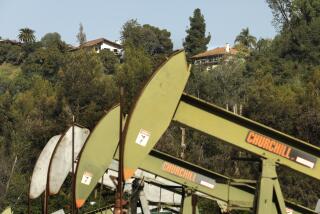Exemption Likely to Drilling Rules
- Share via
WASHINGTON — Despite rising complaints that a common oil and gas drilling technique threatens drinking water supplies, the House Energy Committee appeared poised Wednesday to approve legislation exempting the practice from future regulation.
The technique, developed by Halliburton Co., involves injecting pressurized fluids deep underground to encourage oil and gas to rise to the surface. For years, Halliburton and other energy firms have been fighting efforts to regulate the practice under the Safe Drinking Water Act.
The practice, known as hydraulic fracturing, is generally considered safe. But there has been growing concern as its use has proliferated in coal bed methane fields around the country and in some of the geologically fragile oil and gas repositories in the West.
On Tuesday, the House Energy Committee rejected proposals by Democrats to modify the proposed exemption. The first, by Rep. Diana DeGette of Colorado, would require a scientific study of the practice before the exemption took effect. The second, by Rep. Hilda L. Solis of El Monte, would prohibit use of diesel fuel in underground injection.
Both amendments were defeated on party-line votes. Republican Reps. Heather Wilson of New Mexico and John Sullivan of Oklahoma argued that fracturing was safe and showed no evidence of problems.
Oil companies and their backers point out that the nation’s three leading fracturing firms: Halliburton, Schlumber- ger Technology Corp. and BJ Services Co. have signed an agreement with the Environmental Protection Agency promising not to inject diesel fuel in future fracturing operations. Further, they note that an EPA study of fracturing in coal bed methane wells concluded last year that the technique “poses little or no threat” to drinking water.
Despite such reassurance, environmental activists, several landowners and an EPA whistle-blower held a conference call with reporters Wednesday to argue that hydraulic fracturing might be causing problems around the country. The call was sponsored by the Oil and Gas Accountability Project of Durango, Colo.
The whistle-blower, Weston Wilson, a 32-year veteran of the EPA, said that a recent agency review of the safety of the drilling technique did not use established agency standards and relied on a peer review panel dominated by energy industry personnel.
His claims, first reported by the Los Angeles Times in October, are now under review by the EPA’s inspector general.
The conference call included residents of Colorado and Alabama who claimed that their water and, in some cases, their health had been damaged by fracturing on their property.
Fracturing generates $1.5 billion a year for Halliburton, about one fifth of its energy-related revenue. The Houston firm was formerly headed by Vice President Dick Cheney.
Efforts to regulate hydraulic fracturing became a concern for the industry in the late 1990s, when Cheney was Halliburton’s chief executive. A group of Alabama residents went to court seeking to force regulation of the practice, claiming that their drinking water had been fouled by fracturing fluid used to extract methane from coal beds.
In 1997, the 11th Circuit Court of Appeals in Atlanta ruled that fracturing should be regulated under federal drinking water law. That decision, which requires permits and special oversight, stands today, although it hasn’t been applied outside the 11th Circuit. Energy companies argue that the decision is mistaken and that Congress should effectively overrule it.
Halliburton argued in a legal brief at the time that regulation “could have significant adverse effects on its business.”
The energy task force that Cheney led in 2001 praised fracturing but did not mention the exemption request or the safety concerns then under review by the EPA.
A spokesman for the American Petroleum Institute said Wednesday the organization was gratified that the energy legislation was moving forward with the fracturing exemption intact. He said that fracturing had proven safe for years and that it was subject to other forms of federal regulation even if it was exempt from drinking-water laws.
Solis said she would continue to push for a legislative prohibition on the use of diesel fuel and noted that her district in California had been plagued with environmental problems affecting water supplies.
Nonetheless, House staffers predicted the exemption language would be included when the House voted on the long-delayed energy bill this year.
In the Senate, James M. Jeffords, the Vermont independent, has expressed concern about potential danger from the practice and said he would raise the issue in the Senate Environment and Public Works panel, where he is a ranking member.
More to Read
Sign up for Essential California
The most important California stories and recommendations in your inbox every morning.
You may occasionally receive promotional content from the Los Angeles Times.










